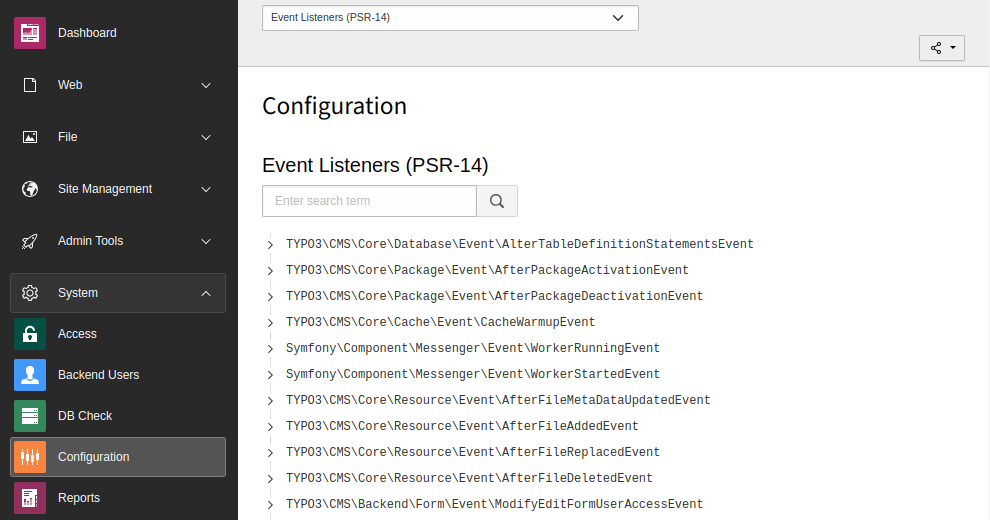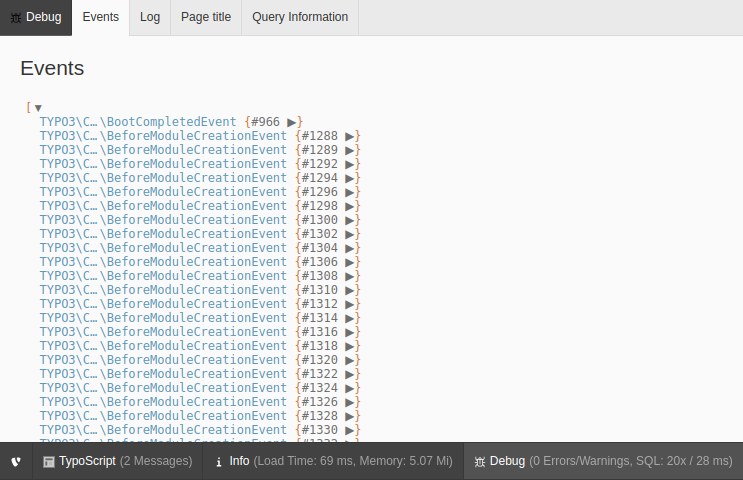Event dispatcher (PSR-14 events)
The event dispatcher system was added to extend TYPO3's Core behaviour in TYPO3 v10.0. In the past, this was done via Extbase's signal/slot and TYPO3's custom hook system. The event dispatcher system is a fully-capable replacement for new code in TYPO3, as well as a possibility to migrate away from previous TYPO3 solutions.
Don't get hooked, listen to events! PSR-14 within TYPO3 v10.
-- Benni Mack @ TYPO3 Developer Days 2019
For a basic example on listening to an event, see the chapter Listen to an event in the extension development how-to section.
Hint
Additional background information on the implementation can be found at https://usetypo3.com/psr-14-events.html
Quick start
Dispatching an event
This quick start section shows how to create your own event class and dispatch it. If you just want to listen on an existing event, see section Implementing an event listener in your extension.
-
Create an event class.
An event class is basically a plain PHP object with getters for immutable properties and setters for mutable properties. It contains a constructor for all properties:
EXT:my_extension/Classes/Event/DoingThisAndThatEvent.php<?php declare(strict_types=1); namespace MyVendor\MyExtension\Event; final class DoingThisAndThatEvent { public function __construct( private string $mutableProperty, private readonly int $immutableProperty, ) {} public function getMutableProperty(): string { return $this->mutableProperty; } public function setMutableProperty(string $mutableProperty): void { $this->mutableProperty = $mutableProperty; } public function getImmutableProperty(): int { return $this->immutableProperty; } }Read more about implementing event classes.
-
Inject the event dispatcher
If you are in a controller, the event dispatcher has already been injected, and in this case you can omit this step.
If the event dispatcher is not yet available, you need to inject it:
EXT:my_extension/Classes/SomeClass.php -
Dispatch the event
Create an event object with the data that should be passed to the listeners. Use the data of mutable properties as it suits your business logic:
EXT:my_extension/Classes/SomeClass.php<?php declare(strict_types=1); namespace MyVendor\MyExtension; use MyVendor\MyExtension\Event\DoingThisAndThatEvent; use Psr\EventDispatcher\EventDispatcherInterface; final class SomeClass { public function __construct( private readonly EventDispatcherInterface $eventDispatcher, ) {} public function doSomething(): void { // .. /** @var DoingThisAndThatEvent $event */ $event = $this->eventDispatcher->dispatch( new DoingThisAndThatEvent('foo', 2), ); $someChangedValue = $event->getMutableProperty(); // ... } }
Description of PSR-14 in the context of TYPO3
PSR-14 is a lean solution that builds upon wide-spread solutions for hooking into existing PHP code (Frameworks, CMS, and the like).
PSR-14 consists of the following four components:
The event dispatcher object
The
Event object is used to trigger an event. TYPO3 has a
custom event dispatcher implementation. In PSR-14 all event dispatchers of all
frameworks are implementing
\Psr\, thus it is possible to
replace the event dispatcher with another. The
Event's main
method
dispatch is called in TYPO3 Core or extensions. It receives a
PHP object which will then be handed to all available listeners.
The listener provider
A
Listener object that contains all listeners which have been
registered for all events. TYPO3 has a custom listener provider that collects
all listeners during compile time. This component is only used internally inside of
TYPO3's Core Framework.
The events
An
Event object can be any PHP object and is called from TYPO3 Core or
an extension ("emitter") containing all information to be transported to the
listeners. By default, all registered listeners get triggered by an event,
however, if an event has the interface
\Psr\ implemented, a listener can
stop further execution of other event listeners. This is especially useful, if
the listeners are candidates to provide information to the emitter. This allows
to finish event dispatching, once this information has been acquired.
If an event allows modifications, appropriate methods should be available, although due to PHP's nature of handling objects and the PSR-14 listener signature, it cannot be guaranteed to be immutable.
See also
The listeners
Extensions and PHP packages can add listeners that are registered via YAML. They
are usually associated to
Event objects by the fully-qualified class name
of the event to be listened on. It is the task of the listener provider to
provide configuration mechanisms to represent this relationship.
If multiple event listeners for a specific event are registered, their order can be configured or an existing event listener can also be overridden with a different one.
The System > Configuration > Event Listeners (PSR-14) backend module (requires the system extension lowlevel) reveals an overview of all registered event listeners, see Debugging event handling.
Advantages of the event dispatcher over hooks
The main benefits of the event dispatcher approach over hooks is an implementation which helps extension authors to better understand the possibilities by having a strongly typed system based on PHP. In addition, it serves as a bridge to also incorporate other events provided by frameworks that support PSR-14.
Impact on TYPO3 Core development in the future
TYPO3's event dispatcher serves as the basis to replace all
hooks in the future. However, for the time being, hooks
work the same way as before, unless migrated to an event dispatcher-like code,
whereas a PHP
E_ error can be triggered.
Some hooks might not be replaced 1:1 to event dispatcher, but rather superseded with a more robust or future-proof API.
Implementing an event listener in your extension
Hint
For a basic example on listening to an event, see the chapter Listen to an event in the extension development how-to section.
Registering the event listener
If an extension author wants to provide a custom event listener, an according
entry with the tag
event. can be added to the
Configuration/Services.yaml file of that extension.
services:
# Place here the default dependency injection configuration
MyVendor\MyExtension\EventListener\NullMailer:
tags:
- name: event.listener
method: handleEvent
identifier: 'myListener'
before: 'redirects, anotherIdentifier'
Read how to configure dependency injection in extensions.
The tag name
event. identifies that a listener should be registered.
The custom PHP class
\My
serves as the listener whose
handle method is called, once the
event is dispatched. The name of the listened event is specified as
a typed argument to that dispatch method.
handle will
for example listen on the event After.
The
identifier is a common name, so
orderings can be built upon the identifier, the optional
before and
after attributes allow for custom sorting against the
identifier
of other listeners. If no
identifier is specified, the service name (usually
the fully-qualified class name of the listener) is automatically used.
If no attribute
method is given, the class is treated as invokable, thus
its
__ method will be called:
services:
# Place here the default dependency injection configuration
MyVendor\MyExtension\EventListener\NullMailer:
tags:
- name: event.listener
identifier: 'myListener'
before: 'redirects, anotherIdentifier'
The event listener class
An example listener, which hooks into the Mailer API to modify mailer settings to not send any emails, could look like this:
<?php
declare(strict_types=1);
namespace MyVendor\MyExtension\EventListener;
use TYPO3\CMS\Core\Mail\Event\AfterMailerInitializationEvent;
final class NullMailer
{
public function __invoke(AfterMailerInitializationEvent $event): void
{
$event->getMailer()->injectMailSettings(['transport' => 'null']);
}
}
An extension can define multiple listeners.
Once the emitter is triggering an event, this listener is called automatically. Be sure to inspect the event's PHP class to fully understand the capabilities provided by an event.
Overriding event listeners
Existing event listeners can be overridden by custom implementations. This can be
performed via EXT:my_extension/Configuration/Services.yaml.
For example, a third-party extension listens on the event
\TYPO3\ with the following code:
SomeVendor\SomeExtension\Seo\HrefLangEventListener:
tags:
- name: event.listener
identifier: 'ext-some-extension/modify-hreflang'
after: 'typo3-seo/hreflangGenerator'
If you want to replace this event listener with your custom implementation, your extension can achieve this by specifying:
# Provide your custom event class:
MyVendor\MyExtension\EventListener\Seo\HrefLangEventListener:
tags:
- name: event.listener
# Use the same identifier of the extension that you override!
identifier: 'ext-some-extension/modify-hreflang'
Note
When overriding an event listener, be sure to check whatever the listener provided as changes to an event. Your own event listener implementation is now responsible for any functionality, because the original listener will no longer be executed.
Make sure that you set the identifier property to exactly
the string which the original implementation uses. If the identifier is not mentioned specifically
in the original implementation, the service name (when unspecified, the fully-qualified name of the event
listener class) is used. You can inspect that identifier in the
System > Configuration > Event Listeners (PSR-14) backend module (requires the system extension
lowlevel), see Debugging event handling. In this example,
if
identifier: 'ext- is not defined, the identifier
will be set to
identifier: 'Some and you could
use that identifier in your implementation.
Note
Overriding listeners requires your extension to declare a dependency on the
EXT: extension (through composer.json, or for non-Composer
mode ext_emconf.php).
This ensures a proper loading order, so your extension is processed after the extension you want
to override.
Best practices
- When configuring listeners, it is recommended to add one listener class per
event type, and have it called via
__.invoke () - When creating a new event PHP class, it is recommended to add an
Eventsuffix to the PHP class, and to move it into an appropriate folder likeClasses/to easily discover events provided by a package. Be careful about the context that should be exposed.Event/ - The same applies to creating a new event listener PHP class: Add
an
Listenersuffix to the PHP class, and move it to a folderClasses/.Event Listener/ - Emitters (TYPO3 Core or extension authors) should always use
Dependency Injection to receive the event
dispatcher object as a constructor argument, where possible, by adding a
type declaration for
\Psr\.Event Dispatcher\ Event Dispatcher Interface - A unique and descriptive
identifiershould be used for event listeners.
Any kind of event provided by TYPO3 Core falls under TYPO3's Core API
deprecation policy, except for its constructor arguments, which may vary. Events
that should only be used within TYPO3 Core, are marked as
@internal, just
like other non-API parts of TYPO3. Events marked as
@internal should be
avoided whenever technically possible.
Debugging event handling
A complete list of all registered event listeners can be viewed in the the module System > Configuration > Event Listeners (PSR-14). The lowlevel system extension has to be installed for this module to be available.

List of event listeners in the Configuration module
To debug all events that are actually dispatched during a frontend request you can use the admin panel:
Go to Admin Panel > Debug > Events and see all dispatched events. The adminpanel system extension has to be installed for this module to be available.

List of dispatched events in the Admin Panel
